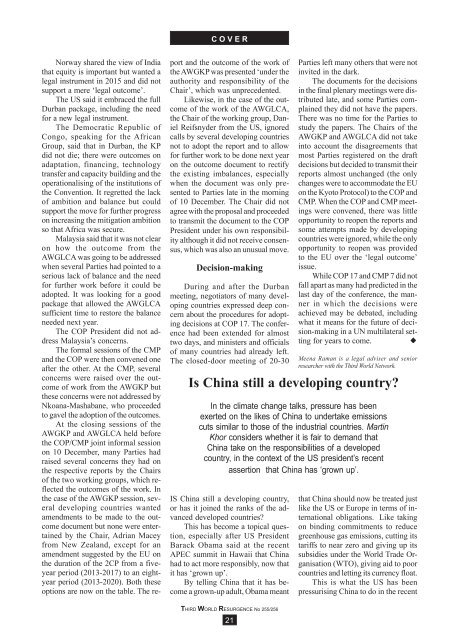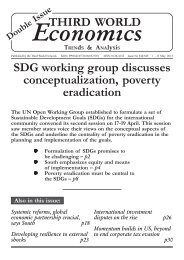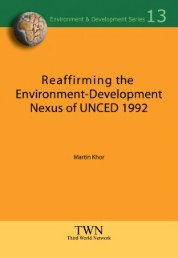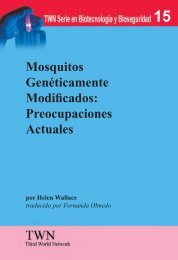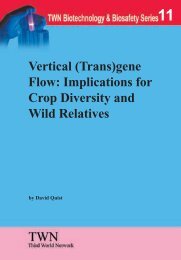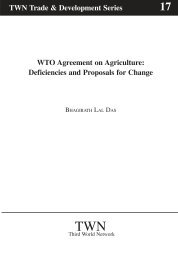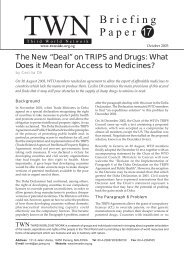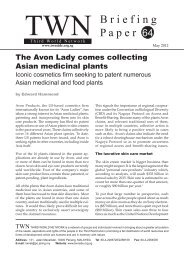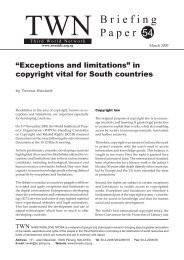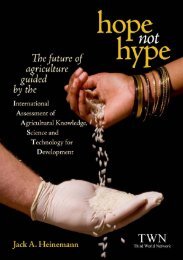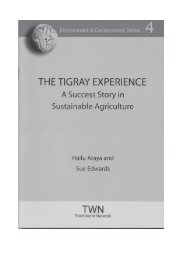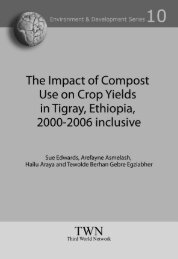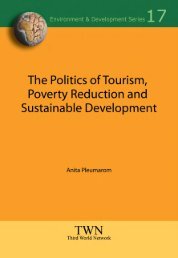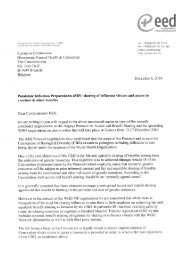Download - Third World Network
Download - Third World Network
Download - Third World Network
Create successful ePaper yourself
Turn your PDF publications into a flip-book with our unique Google optimized e-Paper software.
C O V E R<br />
Norway shared the view of India<br />
that equity is important but wanted a<br />
legal instrument in 2015 and did not<br />
support a mere ‘legal outcome’.<br />
The US said it embraced the full<br />
Durban package, including the need<br />
for a new legal instrument.<br />
The Democratic Republic of<br />
Congo, speaking for the African<br />
Group, said that in Durban, the KP<br />
did not die; there were outcomes on<br />
adaptation, financing, technology<br />
transfer and capacity building and the<br />
operationalising of the institutions of<br />
the Convention. It regretted the lack<br />
of ambition and balance but could<br />
support the move for further progress<br />
on increasing the mitigation ambition<br />
so that Africa was secure.<br />
Malaysia said that it was not clear<br />
on how the outcome from the<br />
AWGLCA was going to be addressed<br />
when several Parties had pointed to a<br />
serious lack of balance and the need<br />
for further work before it could be<br />
adopted. It was looking for a good<br />
package that allowed the AWGLCA<br />
sufficient time to restore the balance<br />
needed next year.<br />
The COP President did not address<br />
Malaysia’s concerns.<br />
The formal sessions of the CMP<br />
and the COP were then convened one<br />
after the other. At the CMP, several<br />
concerns were raised over the outcome<br />
of work from the AWGKP but<br />
these concerns were not addressed by<br />
Nkoana-Mashabane, who proceeded<br />
to gavel the adoption of the outcomes.<br />
At the closing sessions of the<br />
AWGKP and AWGLCA held before<br />
the COP/CMP joint informal session<br />
on 10 December, many Parties had<br />
raised several concerns they had on<br />
the respective reports by the Chairs<br />
of the two working groups, which reflected<br />
the outcomes of the work. In<br />
the case of the AWGKP session, several<br />
developing countries wanted<br />
amendments to be made to the outcome<br />
document but none were entertained<br />
by the Chair, Adrian Macey<br />
from New Zealand, except for an<br />
amendment suggested by the EU on<br />
the duration of the 2CP from a fiveyear<br />
period (2013-2017) to an eightyear<br />
period (2013-2020). Both these<br />
options are now on the table. The report<br />
and the outcome of the work of<br />
the AWGKP was presented ‘under the<br />
authority and responsibility of the<br />
Chair’, which was unprecedented.<br />
Likewise, in the case of the outcome<br />
of the work of the AWGLCA,<br />
the Chair of the working group, Daniel<br />
Reifsnyder from the US, ignored<br />
calls by several developing countries<br />
not to adopt the report and to allow<br />
for further work to be done next year<br />
on the outcome document to rectify<br />
the existing imbalances, especially<br />
when the document was only presented<br />
to Parties late in the morning<br />
of 10 December. The Chair did not<br />
agree with the proposal and proceeded<br />
to transmit the document to the COP<br />
President under his own responsibility<br />
although it did not receive consensus,<br />
which was also an unusual move.<br />
Decision-making<br />
During and after the Durban<br />
meeting, negotiators of many developing<br />
countries expressed deep concern<br />
about the procedures for adopting<br />
decisions at COP 17. The conference<br />
had been extended for almost<br />
two days, and ministers and officials<br />
of many countries had already left.<br />
The closed-door meeting of 20-30<br />
IS China still a developing country,<br />
or has it joined the ranks of the advanced<br />
developed countries?<br />
This has become a topical question,<br />
especially after US President<br />
Barack Obama said at the recent<br />
APEC summit in Hawaii that China<br />
had to act more responsibly, now that<br />
it has ‘grown up’.<br />
By telling China that it has become<br />
a grown-up adult, Obama meant<br />
Parties left many others that were not<br />
invited in the dark.<br />
The documents for the decisions<br />
in the final plenary meetings were distributed<br />
late, and some Parties complained<br />
they did not have the papers.<br />
There was no time for the Parties to<br />
study the papers. The Chairs of the<br />
AWGKP and AWGLCA did not take<br />
into account the disagreements that<br />
most Parties registered on the draft<br />
decisions but decided to transmit their<br />
reports almost unchanged (the only<br />
changes were to accommodate the EU<br />
on the Kyoto Protocol) to the COP and<br />
CMP. When the COP and CMP meetings<br />
were convened, there was little<br />
opportunity to reopen the reports and<br />
some attempts made by developing<br />
countries were ignored, while the only<br />
opportunity to reopen was provided<br />
to the EU over the ‘legal outcome’<br />
issue.<br />
While COP 17 and CMP 7 did not<br />
fall apart as many had predicted in the<br />
last day of the conference, the manner<br />
in which the decisions were<br />
achieved may be debated, including<br />
what it means for the future of decision-making<br />
in a UN multilateral setting<br />
for years to come. ÿu<br />
Meena Raman is a legal adviser and senior<br />
researcher with the <strong>Third</strong> <strong>World</strong> <strong>Network</strong>.<br />
Is China still a developing country?<br />
In the climate change talks, pressure has been<br />
exerted on the likes of China to undertake emissions<br />
cuts similar to those of the industrial countries. Martin<br />
Khor considers whether it is fair to demand that<br />
China take on the responsibilities of a developed<br />
country, in the context of the US president’s recent<br />
assertion that China has ‘grown up’.<br />
that China should now be treated just<br />
like the US or Europe in terms of international<br />
obligations. Like taking<br />
on binding commitments to reduce<br />
greenhouse gas emissions, cutting its<br />
tariffs to near zero and giving up its<br />
subsidies under the <strong>World</strong> Trade Organisation<br />
(WTO), giving aid to poor<br />
countries and letting its currency float.<br />
This is what the US has been<br />
pressurising China to do in the recent<br />
THIRD WORLD RESURGENCE No 255/256<br />
21


